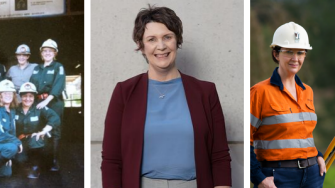
After completing her Bachelor of Mining Engineering at UNSW, Nicole Brook started her career as an underground coal miner. Over the last 25 years she has worked her way up through the industry, and today she is a senior manager at Glencore Coal Australia, leading a team of 60 engineers, geologists, environmental scientists, project managers and accountants.
What activities does your job involve?
My role is very challenging and diverse. I’m often working on complex issues with lots of different people, and that’s what I love about it. My team is responsible for looking at merger and acquisition opportunities, developing new mines, and providing expert technical advice to our 16 operating mines across Australia. I travel all over the world and think I have the best job in the industry.
What triggered your interest in mining engineering?
Engineering appealed as I love solving puzzles and finding better ways to do things, so I started a general engineering degree and through that found out about mining. Mining engineers apply engineering principles to the discovery, evaluation, planning, operations, closure and rehabilitation of mines, and the discipline presented a lot of complex issues for me to sink my teeth into.
Mining also has a real impact on everyday life – minerals are essential to almost everything we use – plus we get to play with multi-million-dollar equipment!
What did you most enjoy about your time at UNSW?
Being in a small class of 30 students was fantastic – we were like an extended family. I moved from Tasmania to NSW to complete my studies and that transition was easier because of the lifelong friendships I made with both my classmates and lecturers.
What innovations in mining are the most exciting, and why?
Automation and digitisation in mining is accelerating which is exciting as it brings a completely new set of conditions and challenges for mining engineers to understand and integrate into our work. They have the potential to completely revolutionise equipment engineering, mine planning, and environmental and social performance.
What’s one of the most satisfying things you’ve worked on?
Seeing a mine come to life is incredible and I’ve been lucky enough to be involved in the development of three mines, from design right through to production.
What are the most important skills that engineers need?
Being able to communicate with a wide variety of people is key. You must be able to tell the story. Often engineers get caught up in the technical how, when really, we need to be explaining the why. Having respect for people, empathy and being a good listener are also important, even though you might not normally associate those attributes with engineers.
What’s surprising about you that you’d like to share with readers?
- I keep bees and my family and friends are always well stocked with honey.
- I failed physics in Year 12.
What career advice would you give your 13 to 18-year-old self?
- There’s no straight line to success. Careers can be messy, and you’ll move sideways or even backwards before moving forwards again. Don’t be discouraged. What might feel like a huge failure can sometimes become a great asset.
